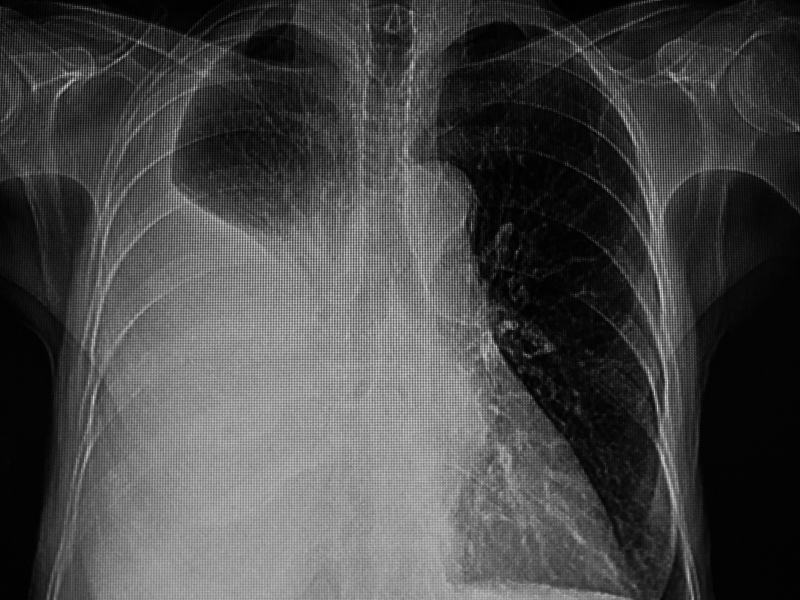Pleural Effusion

A pleural effusion is the collection of fluid in the pleural cavity, which is made up of tissue layers that separate the lungs from the chest cavity. This makes it difficult to breathe. When left untreated, this condition can lead to respiratory symptoms and complications.
Pleura are thin membranes that protect the outside of the lungs as well as the inside of the chest. This lining contains a small amount of liquid that helps to lubricate the lungs when they expand within the chest during breathing. However, if too much fluid accumulates, as a result of a medical condition, complications can emerge.
Causes of Pleural Effusion
There are several potential causes of pleural effusion, including:
· congestive heart failure
· cancer
· liver or kidney disease
· infections
· pulmonary embolism
· autoimmune conditions like rheumatoid arthritis and lupus
· pneumonia
· rupture of esophagus
Types of Pleural Effusion
Pleural effusion can either be transudative or exudative.
· Transudative pleural effusion is caused by increased pressure on capillaries, resulting in protein-rich fluid collections. It is commonly associated with conditions like cirrhosis or coronary heart disease. It may happen if you have:
o congestive heart failure.
o kidney disease
o cirrhosis
o just started peritoneal dialysis
o malnutrition is caused by low amounts of albumin in the blood
· Exudative pleural effusion occurs due to infection, irritation, or inflammation. These can cause more fluid production, less drainage, or both. This arises when a fluid accumulation occurs as the result of:
o Tumor
o Infection
o Inflammation
o Lung injury
The following conditions may cause exudative pleural infusion:
o Cancer
o Pneumonia
o Inflammatory conditions like lupus, pancreatitis, or rheumatoid arthritis
o Tuberculosis
o Heart surgery complications
Symptoms of Pleural Effusion
In some cases, people with pleural effusion may not exhibit any symptoms. However, when the effusion is moderate or large-sized, or if there is inflammation, the following symptoms may be present:
- Persistent cough
- Difficulty breathing or shortness of breath
- Chest pain
- Unexplained weight loss
- Fever or chills
Complications and Outlook
Left untreated, pleural effusion can lead to several complications including:
· Pneumonia
· An infection that causes an abscess.
· Scarring around the lungs
· Respiratory failure
· Pleural thickening and fibrosis
· Emphysema
The outlook for pleural effusion depends on the underlying medical condition and the severity of the effusion.
Pleural Effusion Treatment
Treatments for pleural effusions include:
· Thoracentesis. Your doctor may perform thoracentesis to draw excess fluid and alleviate symptoms if the effusion is significant.
· Tube thoracostomy. Your doctor will insert a plastic tube into the pleural space through a small incision in your chest wall to provide temporary drainage.
· Pleural drainage. In cases of persistent pleural effusions, your doctor may propose pleural drainage with a long-term catheter put into the pleural cavity. This will allow you to drain fluid from your home under medical supervision.
· Medications: Depending on the underlying cause, medications may be used to reduce fluid buildup, treat infections, or control inflammation. This includes diuretics, antibiotics, or corticosteroids.
Pleural Effusion Prevention
You may be unable to avoid causes of pleural effusion. However, you can reduce your risk of pleural effusions by:
· Ceasing smoking
· Avoiding asbestos.
· A healthy diet that is low in salt.
· Taking diuretics
· Limiting fluid consumption if instructed.
Pleural effusion, often known as fluid on the lungs, can occur for a variety of reasons, including cancer and infections. While it rarely has particular symptoms, you may notice evidence of infection or breathing issues.
Seek medical attention if you experience lung-related symptoms or have a fever, as pleural effusion could suggest a serious underlying illness that requires treatment.



